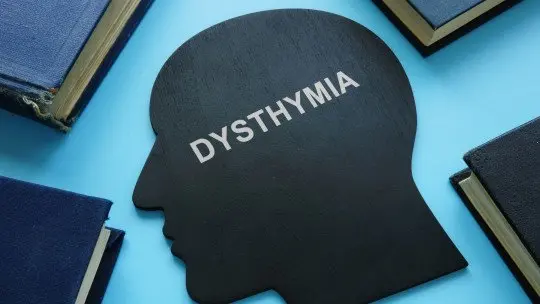
Dysthymia, a chronic form of mild depression, can be disabling due to its persistent symptoms that affect daily functioning and quality of life. Although symptoms are less severe than in major depression, their prolonged duration can significantly interfere with work, school, relationships, and daily activities.
Currently, there is some uncertainty about this clinical picture, so to address it, it is important to obtain accurate information about it. In this PsychologyFor article, we will provide you with information about whether dysthymia is disabling what degree of disability it causes and how long you can be on sick leave due to dysthymia.
Can dysthymia be disabling?
Dysthymia can be disabling although its symptoms are less severe than those of major depression, its chronic nature can have a significant impact on quality of life of people. Dysthymia is a mood disorder that causes loss of interest in daily activities, feelings of hopelessness, and lack of energy.
Although there are some specific differences with depressive disorders, dysthymia is included among the related clinical conditions. According to the DSM-V(1)this problem manifests itself in the following way:
- Persistence of two or more symptoms for a minimum of two years.
- Lack of attention and difficulty concentrating.
- Little or no tolerance for frustration.
- Dysregulation of sleep patterns.
- Decreased or increased appetite.
- Hopelessness regarding the present and future.
- Exacerbated sadness.
Based on these diagnostic criteria, dysthymia is disabling and can cause serious emotional problems if it is not addressed with specific treatments to control the symptoms. In other words, this clinical picture can affect work, social, family performance and academic of any person who suffers from it. To better understand this disorder, don’t miss this article on the Differences between dysthymia and depression.
What degree of disability does dysthymia have?
The degree of disability that dysthymia can cause varies significantly between each person. It depends on several factors, such as the severity of the symptoms, the duration of the disorder, the response to treatment, and the individual’s social and work environment. In general, dysthymia can cause a mild to moderate disability.
Still, in some cases, it can be serious enough to be considered a significant disability. The degree of disability is evaluated based on the following factors:
- Symptom severity: The intensity and persistence of depressive symptoms play a crucial role. More severe and constant symptoms tend to cause greater disability.
- Impact on functionality: The extent to which dysthymia affects a person’s ability to perform daily tasks, maintain employment, participate in social activities, and maintain personal relationships is critical in determining the degree of disability.
- Duration of symptoms: The chronic nature of dysthymia means that symptoms must be present for at least two years. Prolonged duration of these symptoms can increase disability.
- Response to treatment: The effectiveness of treatments (such as psychotherapy and antidepressant medications) in relieving symptoms and improving functionality also influences the degree of disability. If treatments are not effective, the disability may be greater.

How long can you be on sick leave due to dysthymia?
How long a person can be on sick leave due to dysthymia depends on several factors, including the severity of symptoms, response to treatment, and policies specific to the country or organization where you work. In general terms, the period of sick leave due to dysthymia can vary considerably, and the following steps are followed to determine it:
- Temporary disability: initially, the leave is considered temporary disability, and it can last up to 12 months with the possibility of extension for a further 6 months (up to a total of 18 months) if a recovery is expected during that period.
- Evaluation and extension: If after 12-18 months the person has not recovered sufficiently to return to work, the situation can be evaluated to determine whether a permanent disability needs to be granted.
- Permanent disability: If it is determined that the person cannot return to work within a reasonable period of time, a permanent, partial, total or absolute disability may be granted, depending on the degree of disability and functional impairment.
If you want to know how to get out of dysthymia, don’t miss this article.
Can dysthymia cause permanent disability?
Dysthymia can cause permanent disability in cases where the symptoms are severe and chronic, and where significant improvement is not achieved with treatment. People with dysthymia may experience a steady decline in their ability to work, maintain social relationships, and perform daily activities, which in some cases may warrant consideration for permanent disability.
Evaluation to determine permanent disability due to dysthymia involves a thorough assessment of symptoms and its impact on the life of the individual. Mental health professionals, including psychiatrists and psychologists, conduct detailed evaluations and long-term follow-up to determine whether dysthymia has caused irreversible functional impairment.
In many countries, such as Spain, health and labor authorities use these medical reports to decide on granting a permanent disability, which It can be total or partial depending on the degree of affectation. The granting of permanent disability due to dysthymia is not common, but it is possible in cases where treatments have failed to significantly improve the patient’s condition. In such cases, it is recognized that the person is unable to maintain sustained employment due to persistent symptoms of dysthymia.

This article is merely informative, at PsychologyFor we do not have the power to make a diagnosis or recommend a treatment. We invite you to go to a psychologist to treat your particular case.
If you want to read more articles similar to Is dysthymia disabling? we recommend that you enter our Clinical Psychology category.
- American Psychiatric Association (2013). Diagnostic and Statistical Manual of Mental Disorders (5th edition). Arlington: Panamericana Medical Publishing House.
Bibliography
- Gutiérrez, JP (2020). Persistent Depressive Disorder (Dysthymia) from Cognitive-Behavioral Intervention. Bucaramanga Sectional Bolivarian Pontifical University. Faculty of Psychology.








